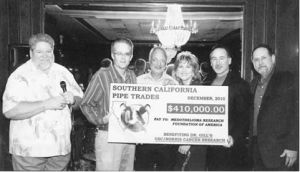Mesothelioma Treatments begin with better therapy research and an area that has received increased scientific attention is targeting biological pathways that appear to be specific to cancer. The Mesothelioma Research Foundation of America is particularly interested in the biological pathways that are specific to malignant Mesothelioma cancer.
Our lead researcher, Dr. Parkash Gill, M.D., Ph.D. at USC Norris has spent years growing our understanding of both the genetics and the cellular biology of cancer. This allows us to try different targeted approaches where we use a therapeutic drug that interferes with a part of the pathway.
In order to test these various approaches, cell line models are frequently deployed. The cancer cell lines are derived from human patients and grown in the USC Norris laboratories. However, when these cancer cell lines are grown outside of a patient’s infected body, they sometimes acquire other characteristics that change the test results observed when applying drugs being investigated. Our objective is to obtain reliable results.
Therefore, it becomes very important to couple our discovery of new targets very closely with carefully executed clinical trials under FDA monitoring to ensure predictive, reliable cancer cure therapies.
Since 2008, Dr. Parkash Gill and his research team of Ph.D.s have developed an antibody that finds a glucose-regulated protein on the cancer tumor cell surface and inactivates it. Treatment with this antibody has shown marked inhibition of tumor growth with no toxicity to vital organs.
Dr. Gill has also been involved for many years in the study of another protein found on the tumor surface of many cancer types. He says the protein is critical to the formation of new blood vessels that feed the cancer tumor. “It doesn’t matter what makes the tumor-blood-vessels grow, we can stop it,” says Gill. “The nice thing is that all the other blood vessels in the body are fully established [as opposed to weaker, newly formed tumor-blood-vessels], so that his antibody will not effect them.”
Gill and his team have had positive results with the antibody in recent tests, and are preparing for clinical trials to begin this year, 2011. So, the next step in therapy research for a cure to malignant Mesothelioma cancer is clinical trials on patients.
Clinical trials progress in waves of three phases monitored by the FDA, and is a critical part of drug therapy development. Trials are the critical next step in validating the research findings made in the laboratory leading to the ultimate truth about the drug therapy. Discovering this truth is not possible without the cooperation of volunteer patients infected with malignant Mesothelioma, who are willing to participate in clinical trials for the good will to future generations of cancer patients. Many volunteers discover an inner peace that makes it all worth it because they are willing to submit to a clinical trial that may someday provide a cancer cure for another person with cancer, and that someone could very well be their child!
While some of your family members may be concerned, even scared, for you by the idea of participating in a mesothelioma clinical trial, most cancer patients can not find a negative issue associated with giving it a try. The mesothelioma cancer patient is generally doing everything they can to get cured of the disease, looking for all the most current methods of treatment, and clinical trials provides increased monitoring as a bonus to the treatment at no cost.
So, the immediate benefit to a mesothelioma patient who participates in a clinical trial is that the oncologist researcher ensures by writing the trial protocol, the trial will provide the most modern and current standards-of-care. Even when the researchers may not know if the treatment itself is going to work, they can assure patients are receiving top-notch standard-of-care treatment and monitoring beyond what they would normally encounter.
Finally, in addition to labor time, researcher determination, and cancer patient participation, clinical trials cost a lot of money. It is estimated that $100 million to $1 billion is spent in getting a single drug from discovery to the public. It can be very frustrating for the researcher, in our case Dr. Gill, and very hard to get funding once the study has passed the discovery phase. Many good ideas emerge, but then the drug companies play it “safe” and will not invest in something unless it’s well proven. This is a huge gap!
The Mesothelioma Research Foundation of America serves to help donors bridge this gap. Our purpose is connect mesothelioma cancer patients with clinical trials, and their family members and friends who wish to demonstrate their support by donating money needed to fund the clinical trials. One hundred percent of every dollar received through the Mesothelioma Research Foundation of America is channeled directly into projects like Dr. Gill’s. We believe there is great promise and hope in Veglin and our Foundation has funded 100% of Dr. Gill’s research on Veglin through the FDA approved Phase I and Phase II clinical trials.. Dr. Gill says, “Clinical trials are a very methodical way to tell what a drug really works, and then to also determine that it’s better than what’s out there — without which, we don’t make any progress.”
We are now ready to launch into the final and critical Phase III trials, but this will require your financial support to help us fund the research that will lead to the quickest cure for mesothelioma. We believe that Mesothelioma, a cancer of the lining of the lungs caused by asbestos exposure, can be cured with Veglin.
So, please help us bring a cure from this dreadful disease to patients. Give generously, you and your friends, to the Mesothelioma Research Foundation of America.





